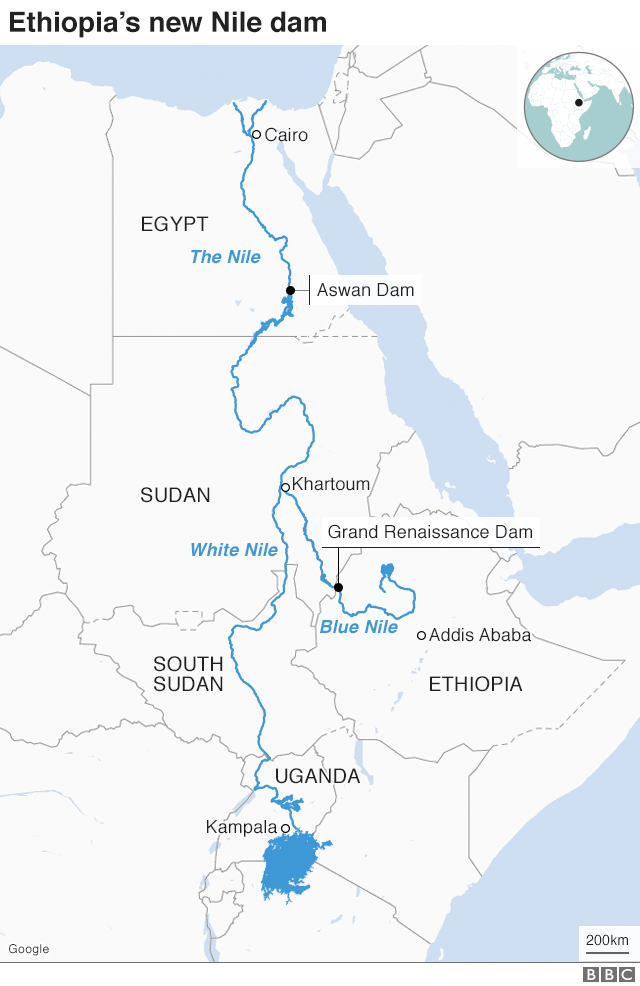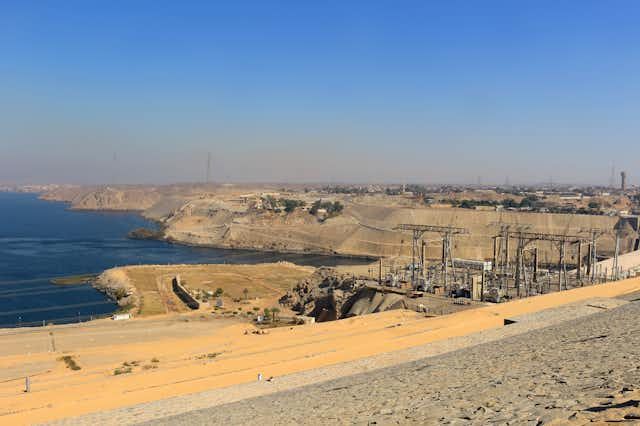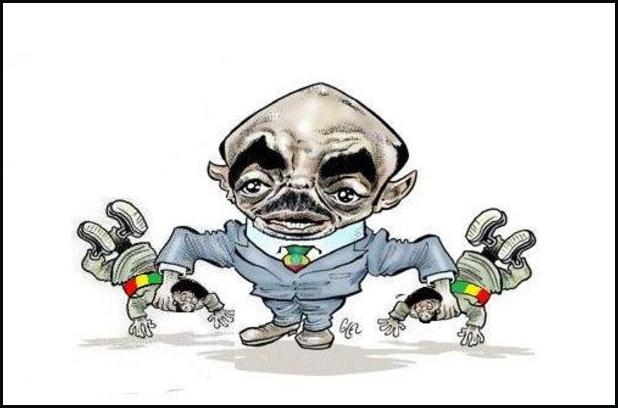
Nile dam row: Egypt fumes as Ethiopia celebrates
By Magdi Abdelhadi: Egypt analyst
https://www.bbc.com/news/amp/world-afri ... ssion=true
29 July 2020 Africa
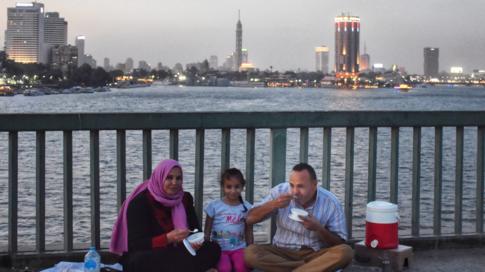
GETTY IMAGES: The Nile is seen as Egypt's lifeblood - without its waters the country fears for its survival
As Ethiopia celebrated rains which began filling a controversial dam on a tributary of the River Nile, Egypt was fuming.
The North African nation had long been opposed to any development on the Nile upstream that could reduce the amount of water it receives from the river and has regarded the Ethiopian project as an existential threat.
The Grand Ethiopian Renaissance Dam (Gerd), which has been in construction since 2011, is now holding back water - and contains 4.9 billion cubic metres (bcm) of the Blue Nile's water after this season's rains.
This is despite Egypt's insistence that no filling should take place without a legally binding agreement about how the process will be managed.
In another four to six years the reservoir, which sits behind what will be Africa's largest hydroelectric plant when it comes into operation, is expected to reach 74bcm.
________________________________________________________
Satellite pictures from earlier in July showed the dam filling up:
________________________________________________________
Egypt and Ethiopia, along with Sudan through which the Blue Nile also flows, have been negotiating for the best part of a decade, but all the while the dam has been built.
They signed a declaration of principles in 2015 which spoke about the "spirit of co-operation", but Egypt feels that has been missing.
In the past year, it has invested time and political capital by lobbying at the highest international level and seeking help from the US and the UN, but to no avail.
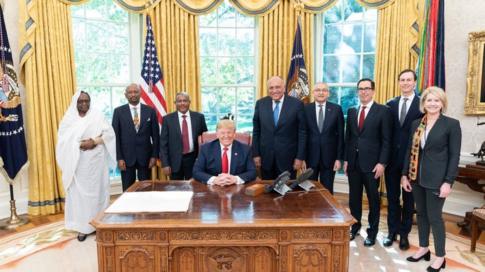
US PRESIDENT'S OFFICE: The US tried, but failed, to get Egypt and Ethiopia to sign up to an agreement
Egypt appears to have lost that battle.
It has failed to force Ethiopia to abide by the 1997 UN Watercourses Convention requiring upstream countries to consult the downstream states before embarking on projects of this magnitude.
At this point it is hard to imagine what else Egypt could possibly do today other than acquiesce and do as much damage limitation as possible. However, a military option has never been explicitly ruled out.
The Egyptian leadership has repeatedly said it remains committed to resolution through negotiation. But it usually adds the caveat that "all options remain on the table" - a phrase that often alludes to possible conflict.
The government has repeatedly described the issue of the Gerd project as a matter of life and death. This will be especially true if there is a substantial reduction of the amount of the water that reaches Egypt as a result of the dam.
________________________________________________________
Explore the Nile with 360 video
Alastair Leithead and his team travelled in 2018 from the Blue Nile's source to the sea - through Ethiopia and Sudan into Egypt.
________________________________________________________
But now, with the filling a reality the Egyptian government has tried to put a brave face on things.
Officially, it said that Egypt remained committed to the current diplomatic process which is being handled by the African Union, and repeated its old mantra that it will not accept unilateral action from Ethiopia.
Water poverty
It has also insisted that any future agreement must endorse what it sees as its established Nile rights to 55bcm of water from the river.
On average 49bcm of water flows through the Blue Nile tributary a year and Ethiopia has consistently refused to concede to giving Egypt a commitment to a specific amount that it will allow to flow through the dam. It sees Egypt's demands as a legacy of agreements that were made without its involvement.
Egypt's official response betrayed powerlessness rather than resolve.
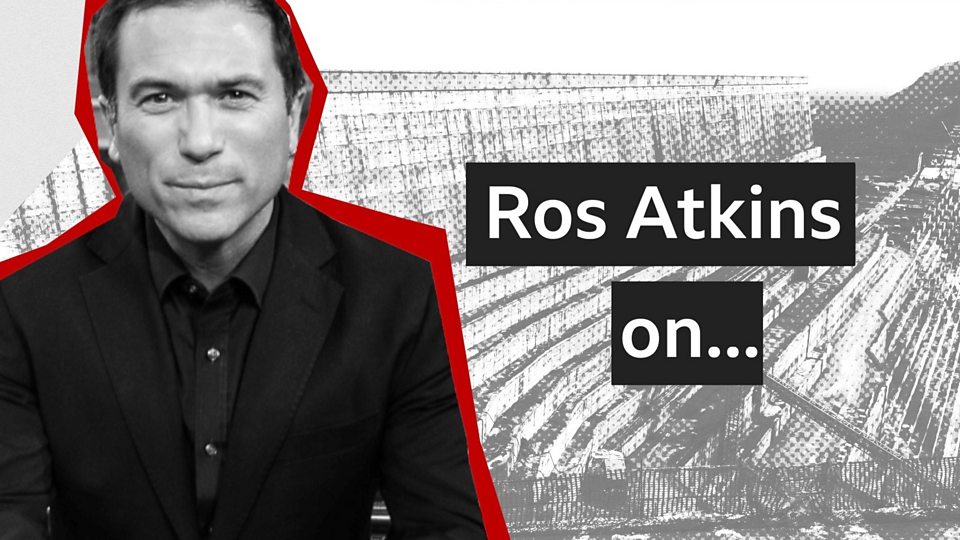
Ros Atkins on...why can’t Egypt and Ethiopia agree on the Nile dam?
The stakes have never been higher for the country.
Describing the Gerd as an existential threat is not hyperbole. Egypt is an arid country and is seen as very water-poor.
The World Bank classifies water scarcity as when there is less than 1,000 cubic metres of fresh water per person a year. In Egypt, the figure is 550 cubic metre per person annually, according to the government.
Just take a look at the map, where 90% of its 100 million population are squeezed into the narrow Nile valley, 6% of the country's total area, beset by vast deserts on both sides.
'Outmanoeuvred'
The Nile provides Egyptians with their primary source of water, for both drinking and agriculture.
Its current annual share of the Nile waters, the now endangered 55bcm, already falls far short of its needs.
This explains that while on an official level Egypt has so far exercised verbal restraint, the media and commentators have not held back.
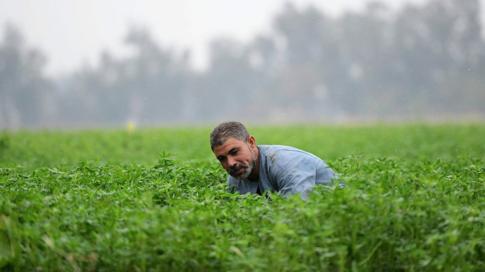
GETTY IMAGES: Egypt says the waters of the Nile are vital for its agricultural sector
To them, Ethiopia had used the drawn out negotiations to blindside the Egyptians while creating facts on the ground to exercise total control over the river.
A triumphalist tweet celebrating the first year's filling of the Gerd by Ethiopia Foreign Minister Gedu Andargachew - which read in part
- particularly inflamed passions.the river became a lake... the Nile is ours
It confirmed what Egyptians had long feared and some replied with all sorts of threats.
An Egyptian columnist begrudgingly acknowledged that Ethiopia had outmanoeuvred his country, but it is not over yet, Imad-al-Din Husayn wrote in the daily Shorouq newspaper, in an effort to reassure his readers.
he added in exasperation and summing up the imbalance that many Egyptians feel.The Ethiopians refuse to believe that without the Nile we would die, literally. They have many rivers and receive around 950bcm of rain water annually. We receive a paltry 55bcm, half of what we actually need, which is also half of what their livestock consumes annually,
Diplomatic wrangle
On its part Egypt has launched several water management schemes, which include the recycling of waste water in agriculture, desalination plants, and an ambitious program to change traditional forms of irrigation to the more water saving method of drip-irrigation.
But the argument about Egypt's water poverty is perhaps its strongest card in the diplomatic wrangle, if it can be used to galvanise international support.
Apart from a short advert made in several languages, the Egyptian administration has so far failed to launch a concerted information campaign to win over global backing.
Both in sub-Saharan Africa and even in the US, the Ethiopians appear to have fared much better.
The current chairperson of the African Union is South African President Cyril Ramaphosa. Many Egyptians believe that South Africa is biased in favour of Ethiopia, which does not augur well for the talks.
If these fail to produce a satisfactory result, Egypt believes it can take the issue back to the UN Security Council for a resolution that ties the hands of Ethiopia.
But it is far from certain that it can secure the support of all the five permanent members.
Recent reports have suggested that both China and Russia will oppose such a move, because they do not want to set a precedent as they both have their own river disputes with downstream neighbours.
Failure to bridge the gap between Egypt and Ethiopia could spell disaster for both.
Turmoil in Egypt as a result of drought and potential mass displacement could have far reaching consequences across the whole of North Africa and Europe. And an armed conflict between two of Africa's largest and greatest nations should be a scary prospect not just for the Africans, but for the whole world.
